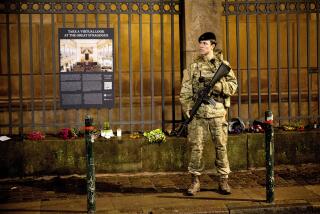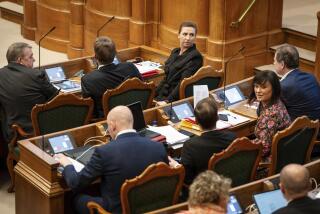Muslim Lawmaker Assimilated and Berated
- Share via
COPENHAGEN — Ever since he left the laundry-draped alleys of his Syrian village and glimpsed the red-light district of Copenhagen, Naser Khader’s life has been a curious, and sometimes dangerous, navigation between Islam and the West.
A man with “democracy” tattooed in Arabic on his arm, the Danish lawmaker epitomizes Europe’s struggle to integrate moderate Islam into secular democracy. The Danes view him as the ideal Muslim, a multilingual author with European sensibilities for tolerance. Islamists regard him as a traitor, a factory worker’s son who bartered his identity for a bit of Western acceptance.
It is sensitive cultural and political terrain, but Khader’s convictions are anything but opaque. This was apparent early this year when he condemned violent Muslim protests against a Danish newspaper’s publication of caricatures of the prophet Muhammad. Khader argued that the worldwide demonstrations were orchestrated by radical clerics to aggravate tensions between East and West.
“If you don’t want to look at the cartoons, don’t buy the paper,” Khader, one of three Muslims in the Danish parliament, said in a recent interview at his office. “I understood why Muslims were upset. But you protest in the frame of democracy.
“Why this overreaction? I asked the Islamists why they didn’t demonstrate when Abu Musab Zarqawi killed innocent hostages in Iraq. Why didn’t they protest when Bin Laden sent planes into New York? This is against Islam too.”
Such sentiments earned Khader, who travels with bodyguards and a wry sense of humor, at least one death threat from an extremist imam. A sturdily built man who perfected his Danish on neighborhood soccer fields, he is bemused by the discreet men who shadow him. “I think it’s sad,” he said, “that police have to protect those who speak for democracy. But the world has changed. This is my life.”
The 43-year-old lawmaker and his adopted Europe are caught amid disturbing agendas. Radical Islamists and anti-immigration attitudes are jeopardizing Muslim integration, giving rise to right-wing political groups such as the Danish People’s Party. Muslims with immigrant backgrounds often face high unemployment and alienation, which has led to terrorist threats, including an alleged plot several weeks ago by three men to detonate a bomb in Denmark.
Khader has tried to become a unifying voice; his politics spring from a childhood of trying to fit in and succeed. But his unapologetic political message, praised by secular Europeans, has irritated conservative Muslims. They consider him a man who has drifted too far to the other side, marrying a native Dane, not attending Friday prayers, sipping beer and attending soccer games in a jersey that resembles the Danish flag.
“Naser Khader is irrelevant to Muslims in this country,” said Ahmed abu Laban, an outspoken Islamic leader in Copenhagen. “His role is to keep bombarding Muslims and Muslim values. He represents that strain of thought in Europe that’s too cowardly to face legitimate Muslims. So they get people like Khader to act as a human shield and to spit in our face.”
David Trads, a political analyst who has written a book on Islam in Denmark, said:
“Many are saying that Khader’s like an Uncle Tom. That’s not a fair criticism, but he wants to make sure everyone in Denmark understands that there’s a very serious situation with the Islamists. He wants also to build a bridge between moderate Muslims and Danes.”
Dressed in a blue blazer and pinstriped shirt open at the collar, Khader sat the other day at a table strewn with papers, a folder and a book titled “Cradle of Islam.” A biography of U.S. Sen. Hillary Rodham Clinton sat on a nearby shelf. Khader, who is straightforward instead of tactical when it comes to politics, weighed the aspirations and pitfalls of being identified as a European and a Muslim in the same breath.
The atmosphere was less volatile in 1974, when an 11-year-old Khader and his mother, three brothers and a sister left their Syrian village to join his father in Copenhagen. The elder Khader, a Palestinian, was among those who had come to Denmark years earlier to fill Northern Europe’s need for laborers and factory workers. His parents weren’t religious -- his father was a Marxist -- and unlike today, Islamic head scarves were rarely spotted along the city’s canals and alleys.
“There was no Islamophobia in Denmark in the 1970s,” said Khader, who first tasted rye bread and licorice on the sidewalks of his new city, where sometimes the “working girls” near the red-light district bought him ice cream on his way home from school. “It was a different world. I had come from a village where the only TV set was in a coffee shop for men.”
The tone in Denmark shifted a decade later, however, when refugees from the Lebanese civil war began arriving. More Muslim immigrants landed throughout the 1990s, along with imams financed by radical Islamic groups in the Middle East.
The gap between the parallel societies of Muslims and Danes widened after Sept. 11, and the controversy over the Muhammad caricatures further exposed the integration failures in a nation that prided itself on equality.
Danes were left with the moral question of how far the vaunted tradition of Scandinavian tolerance extended. Muslims, who account for about 200,000 of the population of 5.4 million, are split between those such as Khader and the more extremist voices angry about discrimination and issues such as the participation of Danish troops in the U.S.-led war in Iraq.
“It’s not a clash of civilizations. It’s a clash of ideologies, and the largest part of that is between Islamists and moderate Muslims,” Khader said, adding that Middle East extremists were trying to exploit Muslim integration problems in Europe. “I’ve founded a group called Democratic Muslims. We’re going to hold an international conference. We need to oppose the well-organized Islamists.
“We don’t know enough about the Islamists,” he said. “Who are they? What’s their thinking? Why is radical Islam so attractive to people even born in this country?”
Khader says much of the blame lies with religious leaders such as Abu Laban, who organized a Muslim delegation to the Middle East to gain diplomatic support for protests against the Muhammad cartoons. The demonstrations in Europe were largely peaceful, but the outrage in the Middle East and other regions led to violence, deaths and the storming of Danish embassies.
“I went to Abu Laban’s mosque when I was younger, but then I got tired of his politics,” said Khader, a former Copenhagen city councilman with a master’s degree in political science. “He started talking about then-President Reagan and the first President Bush. I couldn’t listen to him anymore.
“In Denmark today there are between 100 and 120 imams, but only five or six of them [radicalized] the controversy around the cartoons.”
Abu Laban said that he was opposed to violence and that “relations between Danes and Muslims are not so fearful as some might imagine.”
When asked about Khader, Abu Laban said, “Unfortunately, Mr. Khader is riding two horses, and in my opinion, he doesn’t fulfill even the minimum of being called a Muslim.”
Khader said he was aware that some might perceive him as a patsy for the West’s idea of a Muslim. Europe constantly sifts through the rhetoric of radical mullahs and fundamentalist ideologues to find what it considers palatable Muslim voices. This search is growing more intense as the continent’s population ages and immigrants are needed to bolster its economies and fund its welfare states.
Khader said Danes had begun to move away from stereotyping Muslims, but overall the society had been slow to embrace multiculturalism. There are indications that since the publication of the cartoons, Danes are more skeptical about Muslim integration.
The Danish People’s Party controls 13% of the parliament; the nation’s new bestseller compares radical Islam to Nazism, calling it a threat to Western freedoms.
“It’s not enough to think that all Muslims must look like me,” Khader said. “Integration has to be for liberal and conservative Muslims, for Muslims who wear head scarves and for Muslims who are devout. Europe must accept this fact.”
Khader had to accept it within his family. Five years before his death, Khader’s father rediscovered his faith and became an observant Muslim. Khader’s mother, who wore no head scarf when she arrived as an immigrant, wears one today.
More to Read
Sign up for Essential California
The most important California stories and recommendations in your inbox every morning.
You may occasionally receive promotional content from the Los Angeles Times.











